December went down in Polish history exceptionally. In most cases, these were tragic events that influenced the further fate of the nation. The first and most obvious anniversary for most Poles is, of course, December 13, 1981 - the introduction of martial law. The date ending the "Carnival of Solidarity" also meant the end of hopes for system changes. It also marked the end of mass support for the opposition. However, you can ask yourself when the communist authorities decided to use the force option? Was the introduction to the action "Summer-80"?
The summer of 1980 was hot, and not only because of the temperatures that prevailed at the time. At that time, every summer was very warm. This, however, differed from the previous ones, as the tragic economic situation made society's life a pain. The shops were empty. In addition, prices were steadily increasing. The response to this policy of the authorities were strikes.
Workers in the streets
The then First Secretary of the Central Committee of the Polish United Workers' Party, Edward Gierek, wrote in his memoirs that he had promised himself that he would never use weapons against society. Indeed, the strikes were liquidated with promises to raise wages. It quickly became obvious that "whoever goes on strike gets". It was, however, a short-sighted policy. The wave of strikes was moving from the south of Poland to the north.
In mid-August, the Gdańsk Shipyard - the region's largest workplace - went on strike. The protesting shipyard workers demanded the employment of Anna Walentynowicz, dismissed for her activity in Free Trade Unions. Already during the talks with the management, the demand to employ Lech Wałęsa was added. The second postulate concerned a wage increase by two thousand zlotys for each employee. The third - the construction of a memorial to the fallen in December 1970, and the last - family additions.
The promise to settle most of the postulates led to the end of the strike. The workers leaving the shipyard were stopped by heroic women, including Alina Pieńkowska, Anna Walentynowicz and Ewa Ossowska . Thanks to their attitude, the workers started a solidarity strike. The Inter-Enterprise Strike Committee headed by Lech Wałęsa was created. The committee formulated the famous 21 demands. Twenty authorities were ready to fulfill. However, the former was unacceptable. It would mean consent to the creation of trade unions independent of the party.
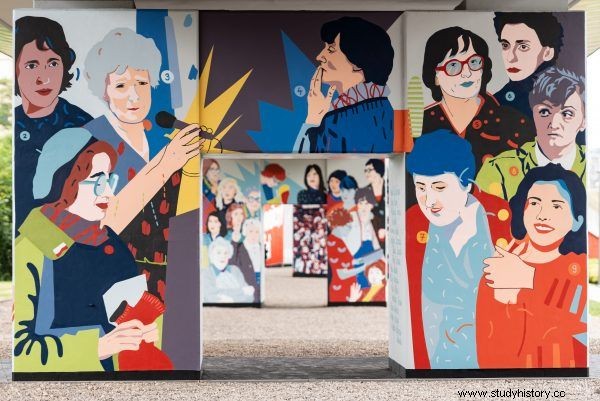
Mural of the Women of Solidarity
Difficult negotiations have started. The liquidation of the strike by force was also considered. The hardliners in the PZPR authorities were in favor of such a solution from the very beginning, and were also opposed to an agreement with the protesters in Gdańsk. At the time, such a solution was not considered for various reasons. The prevailing opinion was that you had to reach an agreement even at the cost of serious concessions. Acceptance of the 21 demands, even if it was a necessity at the time, could not, of course, mean consent to such a serious breach in the system as consent to the establishment of trade unions independent of the party. The direct dependence of the citizen on the state's sole employer gave the authorities an extraordinary advantage. Any concession on this point had to mean trouble.
It should also be remembered that Poland did not function in a vacuum - it was dependent not only on the USSR, but also on other countries of the camp. And in them, changes similar to the Polish ones were not possible. The decision to conclude the agreement was forced by the determination of practically the entire society. As the situation in Gdańsk was reported by the chief negotiator on the part of the government - Mieczysław Jagielski during the Plenum of the Central Committee of the Polish United Workers' Party:
A characteristic feature is great determination. There is a general strike in Gdańsk, with the total support of the public. If something works, then only with the consent of the MKS. (…) It is a very well organized force. They do not show fatigue. My feeling is that we will have to give our consent to the formation of free trade unions.
When asked about his personal assessment of the situation, Jagielski decided that the strikers were a genuine political force. He also emphasized the growing danger: "Today they still ask us about intercourse and consent, but tomorrow they may not ask". He saw an opportunity to approach the problem actively, and then perhaps new relationships could be mastered with time.
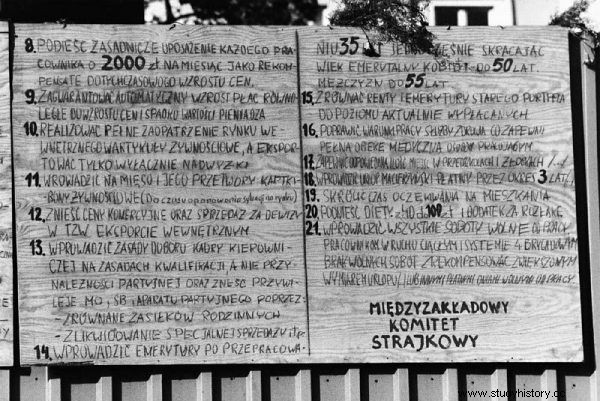
21 postulates of Solidarity
Central authorities were aware that the decision to approve new unions was of great importance. Stanisław Kania put it most emphatically, stressing that the decision on unions would apply to the entire country. He added prophetically that:
(...) such a decision means the creation of an authority much more important than the Seym and national councils combined. Because it will be the creation of a working-class organization, that we may lose our power to exercise power, that we will have our hands tied. Hence the tendency to answer them. But such a decision is also fraught with consequences, because we do not have the strength.
Władysław Kruczek spoke in a similar spirit:
When opposing the consent to the first postulate, answer negatively, graphically arguing that "if we agree, a center will arise, a force that still holds us by the throat".
Gierek also emphasized that:
consent to independent unions is a political act with unpredictable repercussions today for the country and for the entire socialist camp. Today they demand unions, form a force, and then launch an attack on the party, the government, and the Seym. They will arrange trade unions and make a new political postulate.
Interestingly, few of those present considered the issue of consent to the creation of independent trade unions from the point of view of the true interests of the workers whose political representation it had appointed. Only Kazimierz Barcikowski pointed out this. He recognized that "although the movement's inspiration is alien to us, their views on the role of trade unions meet the interests of workers" .
However, even for him, this did not mean consent to limit the role of the party in the system. Tadeusz Fiszbach spoke in a similar vein, arguing that although he is aware of what consent to free unions means, other measures aimed at relieving tension in Gdańsk have already been exhausted. He added that society's solidarity with the strikers is full, and new ties are already emerging in practice.
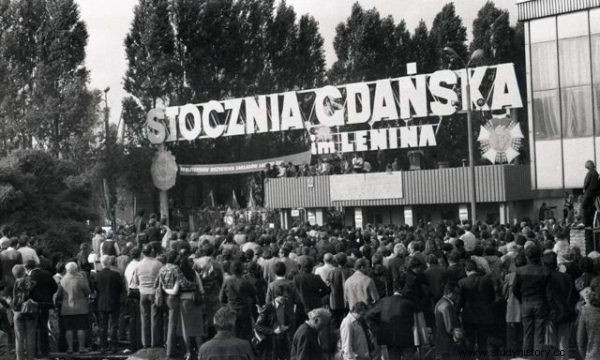
Inhabitants of Gdańsk gathered in front of the historic Gate No. 2 of the Gdańsk Shipyard Lenin
The fear raised by the party's leadership about the neighbors' reaction to significant concessions was not unfounded. On behalf of the Kremlin, the USSR ambassador to Warsaw, A. Aristov, officially concerned about the situation in Poland. He quite unequivocally suggested that the current situation in Poland resembles the situation in the Soviet Union in 1921 . Interviewing the ambassador, Gierek explained that propaganda and repressive activities were being undertaken. However, he opposed the use of the army, arguing that little would have been achieved in this way and that blood would have been shed:
We have the experience of 1956 and other years, when many of the tanks launched into the streets were burned, that a soldier in a tank is only effective when he fires. These are Poles and today we do not even know if the soldiers would shoot the workers.
Despite the awareness of this situation, slogans about taking the strikers by force were repeated in subsequent party meetings. Kania, however, accepted the suggestion to arrest the strike committee for a pipe dream with the help of law enforcement forces, asking rhetorically with what forces can over 70 striking factories be controlled.
The idea of unblocking the Northern Port by force was rejected, as no one had any idea how to keep it later. It was the same with other ports. In addition, the PZPR had troubles with itself. In this context, the voice of A. Karkoszka was dramatic, who stated that
we don't have a party at the moment. She crosses over to the other side at lightning pace and expresses solidarity with the strikers. We want to throw out the slogan "Communists step up" but we do not know if they will occur. We can stay alone.
Wojciech Jaruzelski saw the situation as dramatically. While diagnosing the current situation, he stated that
today we have elements of a general strike. It is only a matter of time before the strike wave spreads across the country. Then there will be a complete economic paralysis, and counter-revolutionary elements may be activated spontaneously. They talked about the declaration of a state of emergency - this is not provided for in our constitution. It is only martial law, but it cannot be introduced either, because how to enforce the rigors when the whole country is over. It's not real. Orders that cannot be enforced must be avoided.
It was clear to most of the conference participants that the situation had only one solution - to make a temporary compromise in order to gain time to take the initiative and prepare a counter-attack. The alternative was, as Prime Minister Pińkowski dramatically put it, "falling into the abyss".
Kania supported him, stating that “you can think of various solutions, but with the exception of those that lead you into the abyss and hope to be reborn from the ashes, because nothing will be reborn. Socialism must be saved. " The concept of saving socialism by correcting errors in the conditions of peace rather than rebuilding it from the ashes was finally supported by Gierek, although he noted that if a decision was made to fight, he would comply with it, although this could lead to the party's loss. Time was the most important thing in this situation.
Gierek urged to appeal to the nation to gain at least a year to strengthen the party. If it fails and the radically tuned workers go to the committees, it will be necessary to shoot . He also declared that he was ready for personal sacrifice:
If you think it is necessary, blame me. I will accept everything with humility, even let them judge me. I agree to anything, as long as we do not slide into the abyss.
It was clear to all participants of the conference that the measures taken in Poland should be consulted with the "allies". Jaruzelski suggested that such a meeting be held close to the border, to keep it secret. Such a meeting did take place. Gierek claimed that the Polish side only informed the Russians about what it was going to do and did not ask for advice. At the time, he could not have assumed that these were his last moments as 1st secretary.
On September 5, 1980, he was replaced by Stanisław Kania. This change was accepted in Moscow, and during Kani's talks with Brezhnev, assurances were made about understanding the difficult situation and for help, including economic help. Brezhnev was to conclude that the Polish leadership would cope with the crisis. This one, however, entered a new phase.
Martial law in… August?
The presented course of events in Poland in this period is widely known, many studies have been written on this subject. However, not everyone knows that preparations for the forceful crackdown on the striking society began practically immediately after the strikes broke out on the Coast in mid-August 1980.
The first stage of these preparations was the appointment by the Minister of the Interior, Stanisław Kowalczyk, of a staff whose task was to develop a plan, and then lead the operation "Summer-80" . The initiator of these actions was not Edward Gierek, but the ambitious and preparing himself to take power in the party and state, Stanisław Kania.
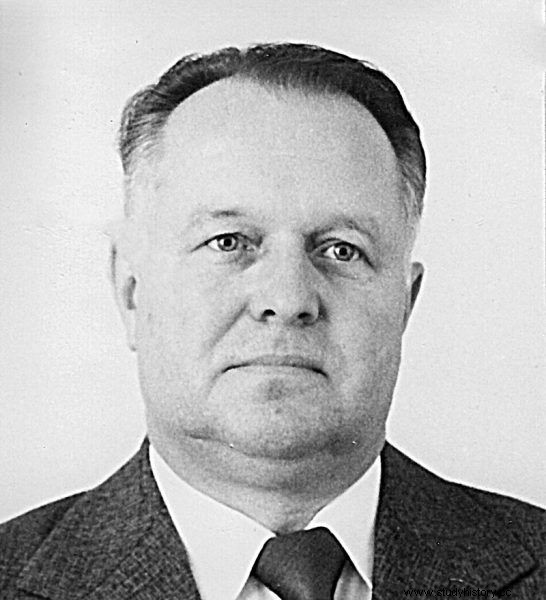
Stanisław Kania
The justification for this step is:
in connection with the growing social tensions, expressed in periodic breaks in the work of many production plants and municipal enterprises, organizational units of the Ministry of Internal Affairs, especially the operational units of the Ministry of the Interior and Provincial Headquarters of the MO will intensify activities aimed at ensuring safety, order and public order in Poland.
The reason for these actions was the statement that as a result of the current economic situation of the country, "organized anti-socialist groups and other hostile elements have taken active steps to transform the moods of dissatisfaction and work breaks into anti-state demonstrations violating the state of internal security and public order". In particular, there were concerns about increasing the influence of "anti-socialist groups" on the environment of workers and youth and preparing them for anti-systemic protests.
The tasks of the newly established entity included active recognition of social moods and taking active measures to reveal, prevent and eliminate possible threats. To this end, it was necessary to intensify the intelligence work, but also to prepare adequate forces and means that could be used in emergency situations . The staff was headed by Maj. Gen. B. Stachura. The counterpart of the central staff were the staffs established in individual Provincial Headquarters of MO. The Security Service played a special role in this plan. It was supposed to recognize threats, using its agents to neutralize and limit or torpedo any hostile actions, such as strikes, demonstrations, etc.
The tasks of the SB as part of the action also included controlling people who had undertaken "hostile" activities in the past . Such persons should be exposed and tried to intimidate them so that they would not engage in harmful actions. Particular attention was paid to activists of the Free Trade Unions, who had to be isolated from the staff of large workplaces. All departments of particular MO structures had tasks to be performed under this action.
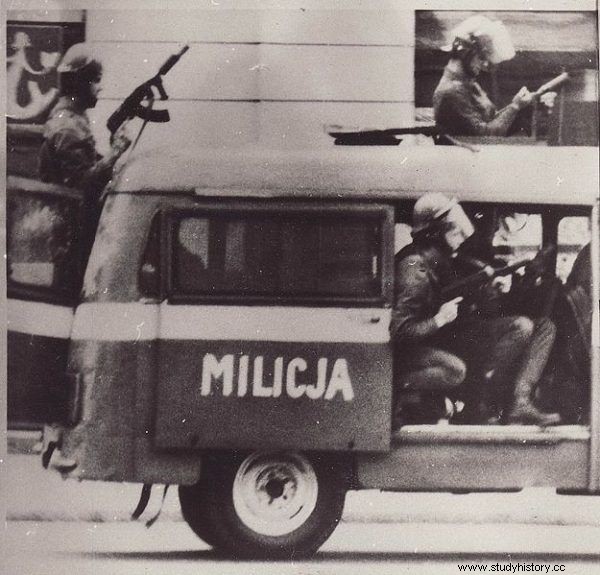
A photograph from the series documenting the demonstrations and actions of ZOMO during martial law in Poland in 1981-1983.
There was even an interest in how to respond to the changes in the structure of the Catholic Church. It was also important to control contacts between "anti-socialist groups" with foreign countries. It was especially important to prepare the forces for the physical defense of party and state buildings, institutions and enterprises. The officers involved in the performance of tasks were also to document any demonstrations, identify their initiators, leaders, etc. In the prepared plans, it was ordered to include the development of the "threat area" in terms of the necessary actions of the Ministry of Internal Affairs units, ensuring the flow of information, clarifying the competence to make decisions about the use of security forces, preparation of applications for an accelerated procedure of punishing persons violating public order, deploying forces in the areas of the greatest threat.
As part of the "Summer-80" action, even the establishment of Reserve Units of the Citizens' Militia was planned. The ROMO company consisted of 75 reserve soldiers. These units had to be provided with uniforms and equipment. They were to include reservists who had completed their basic military service in ZOMO or military units of the Ministry of the Interior, members of parties and youth organizations with impeccable political and moral attitude and physically fit.
In total, 2,700 reservists were mobilized in 22 voivodeship headquarters. In addition, a further 410 reservists were deployed for training at several centers. The created units were put on full readiness on August 26, 1980 . These divisions were to ensure the protection of selected state facilities, not accidentally in the coastal voivodships in the first period. Everything seemed to indicate that using the created units was only a matter of time.
The signing of the agreements in Gdańsk, Szczecin and Jastrzębie meant that temporarily the party authorities did not decide to confront . Therefore, the state of increased readiness and mobilization of these units were canceled. The reservists were re-appointed in December 1980. In the first period, 36 ROMO companies were created, but in mid-December this number was increased to 46. The specter of a force resolution has appeared over Poland again, with the participation of its neighbors.
However, it was concluded that at this stage it would be inadvisable to undertake a general and massive attack by the authorities, as this could lead to consequences that were difficult to predict, "including a general strike bringing an element of confrontation between the authorities and society and the fundamental difficulty of controlling the situation by one's own strength". Therefore, it was proposed to use the tactic of "segmental confrontations". It was a tactic designed to fight the opponent, locally avoiding the fundamental collision between power and society. This tactic was to tire the society and give the authorities time to finish the preparations for the main battle. But more on that in the next text.
